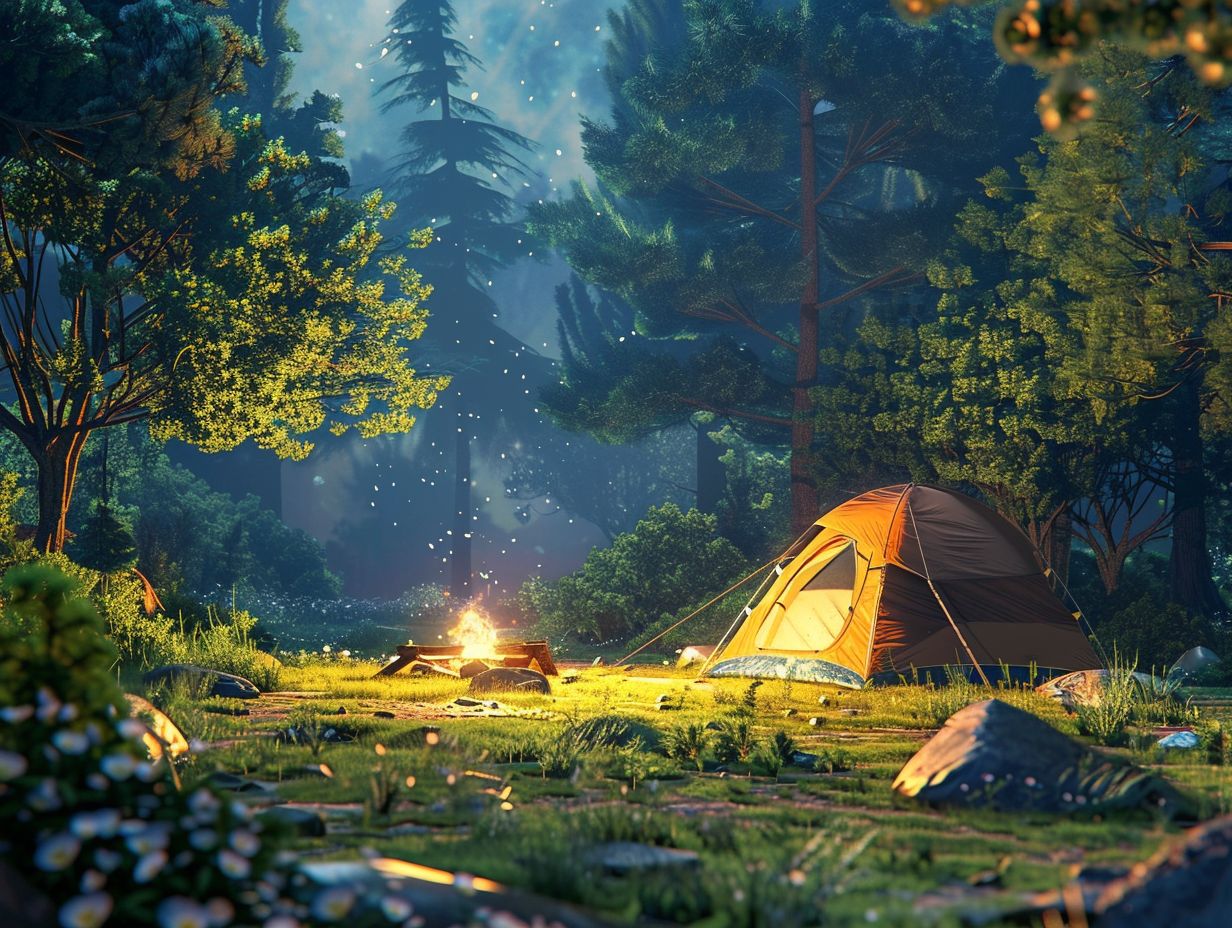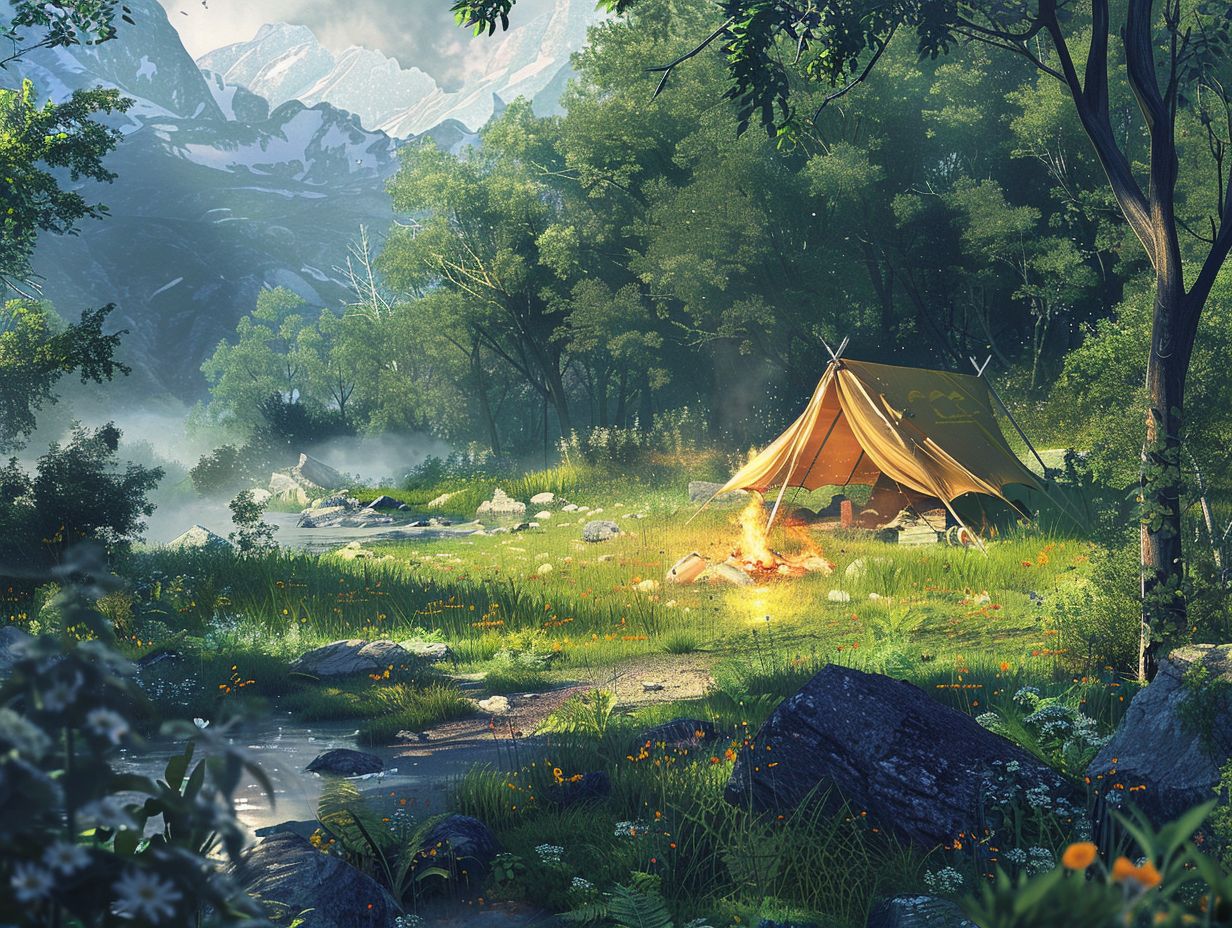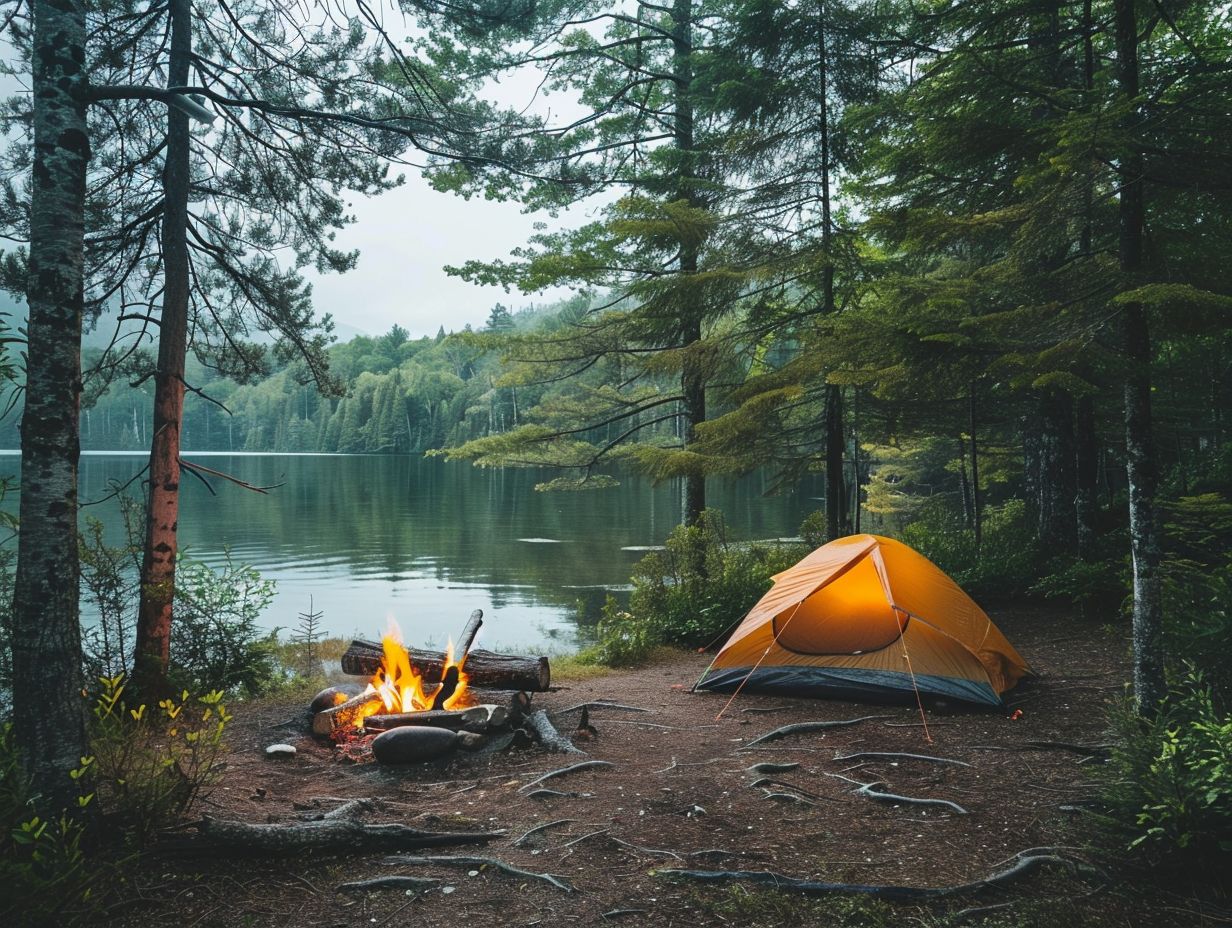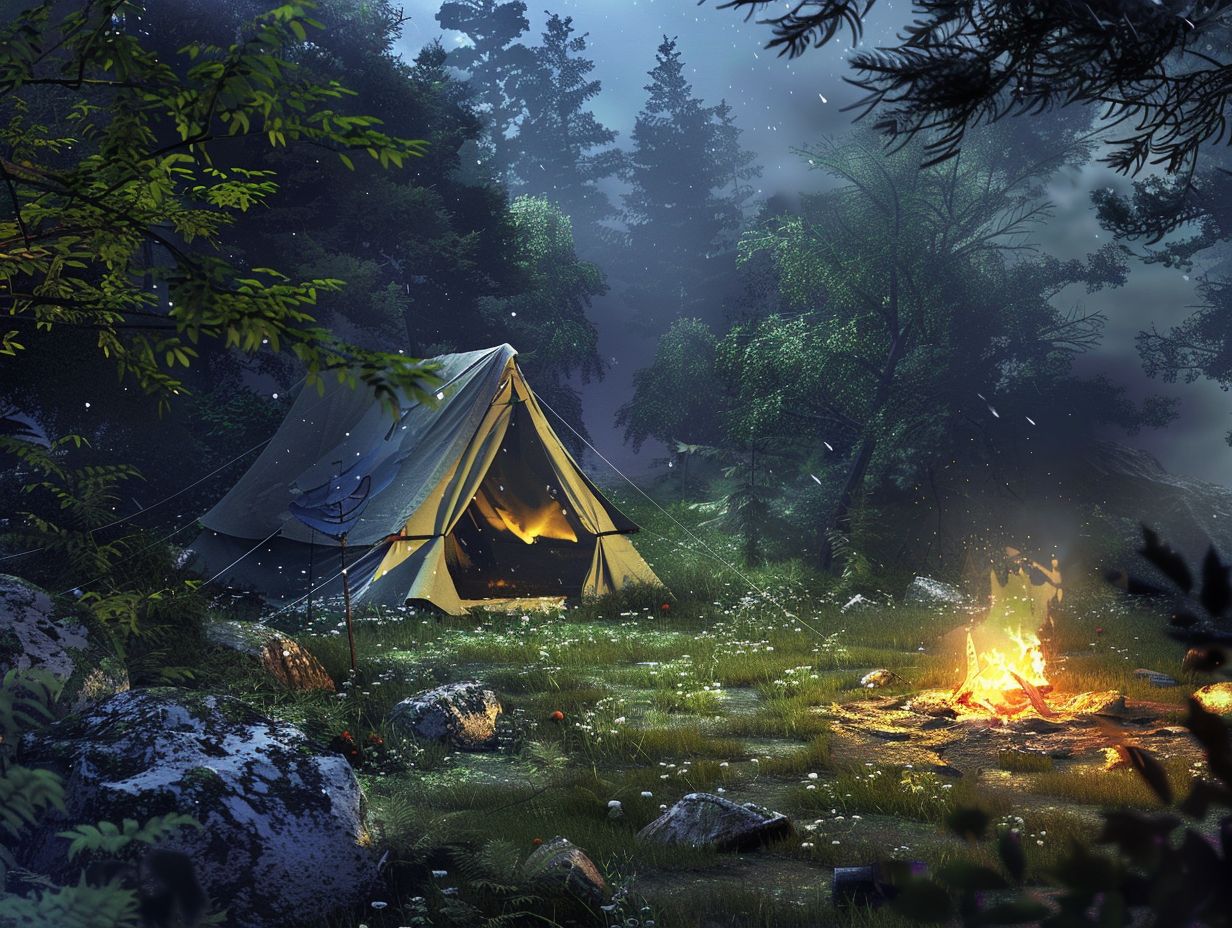If you are planning a camping trip and want to ensure you are following proper campground etiquette, there are several key guidelines to keep in mind. These include respecting quiet hours and properly disposing of trash.
This article will outline 15 essential tips to help you be a courteous camper and maximise your outdoor experience. Whether you are new to camping or an experienced outdoor enthusiast, continue reading to discover how to be a respectful and responsible camper.
Key Takeaways:

- Respect quiet hours for a peaceful camping experience.
- Keep your campsite clean and dispose of trash properly.
- Follow safety guidelines and be mindful of others while enjoying a campfire.
1. Do: Respect Quiet Hours
Respecting quiet hours is crucial for a peaceful camping experience, ensuring the tranquillity of the campsite and the safety of your fellow campers. Typically, quiet hours at camping sites extend from 10:00 pm to 7:00 am, giving campers the chance to rest without disturbance and connect with nature.
To reduce noise during these hours, it is advisable to use headphones for music, speak quietly, and avoid participating in loud activities such as chopping wood or using power tools.
By being aware of your surroundings and keeping noise levels low, you not only promote a harmonious camping environment but also show respect for others who are sharing the area.
2. Don’t: Leave Your Campsite Messy
Leaving your campsite untidy not only detracts from the natural beauty of the wilderness but also poses potential risks to the environment and wildlife in the surrounding area. Rubbish that is left behind can have harmful effects on animals through ingestion or entanglement, disrupting their natural habitats.
It is crucial to ensure that all waste, including food scraps and biodegradable items, is properly packed out. Proper waste disposal involves utilising designated rubbish bins or carrying a rubbish bag to responsibly dispose of waste later on.
Adhering to the ‘Leave No Trace‘ principles is imperative, ensuring that your camping area is left even cleaner than when you arrived.
By implementing these straightforward measures, you play a role in preserving outdoor spaces for the enjoyment of future generations.
3. Do: Follow Campfire Safety Guidelines
Adhering to campfire safety guidelines is crucial for preventing accidents and wildfires, ensuring a secure camping experience for you and others.
One fundamental safety practice for you is to always use a designated fire ring when setting up a campfire. This helps contain the flames and prevents them from spreading uncontrollably.
When selecting wood for your fire, opt for dry and seasoned wood to minimise excessive smoke and sparks. It’s important for you to keep a bucket of water, a shovel, and a fire extinguisher nearby at all times for quick and efficient extinguishing in case of an emergency.
4. Don’t: Play Loud Music

When camping, it is important to avoid playing loud music as it can disturb the tranquillity of the environment and disrupt the experience of others in the vicinity.
Being mindful of the noise levels you generate is crucial while camping, as loud music can interfere with the natural habitat of wildlife and disrupt their behaviours. Additionally, it can be bothersome to fellow campers who are looking for a quiet and peaceful setting to relax.
To enjoy music without causing disturbances, it is recommended to use headphones or low-volume speakers designed for personal listening.
By opting for these devices, you can still appreciate your favourite songs without negatively impacting the surroundings. It is important to remember that preserving the peacefulness of the outdoors benefits everyone in the vicinity.
5. Do: Be Mindful of Other Campers’ Space
Being considerate of other campers’ space fosters a harmonious camping community and ensures everyone’s comfort during the stay.
Respecting personal boundaries not only promotes a sense of mutual respect but also helps create a relaxing environment where everyone can enjoy the beauty of nature without feeling crowded.
Keeping noise levels to a minimum allows campers to unwind and connect with the outdoors without disturbances.
Shared facilities, such as bathrooms and cooking areas, require proper maintenance and cleanliness to ensure that all campers have access to essential amenities in a hygienic and comfortable manner.
By being mindful of these aspects, you can contribute to a positive camping experience for yourself and others.
6. Don’t: Leave Food Out in the Open
Leaving food out in the open can attract wildlife to your campsite, creating potential safety hazards and environmental disturbances. When animals become accustomed to human food sources, it can alter their natural behaviours and increase their dependency on easy food sources instead of foraging in the wild.
This can result in aggressive encounters with campers as animals compete for these readily available food sources. Not only does this pose a risk to humans, but it also disrupts the natural balance of the environment.
To prevent such scenarios, it is essential to adhere to proper food storage practices such as keeping food in secure containers or hanging it out of reach. By being conscientious of our impact on wildlife, we can safeguard both the animals and ourselves while appreciating the beauty of the outdoors.
7. Do: Properly Dispose of Trash
Properly disposing of rubbish is crucial for preserving the cleanliness of the camping area and safeguarding the local environment from pollution. When you leave rubbish behind, not only does it spoil the natural beauty of the location, but it can also pose a threat to wildlife and upset the delicate balance of the ecosystem.
When camping, it is essential to bear in mind that everything you bring in should be taken out. By separating recyclable items and utilising designated waste disposal facilities, campers can play a part in upholding the pristine surroundings for the enjoyment of future visitors and the wildlife that calls it home.
Responsible waste management serves as a small yet impactful gesture to demonstrate reverence for nature and uphold the principles of sustainability.
8. Don’t: Ignore Campground Rules

Failure to adhere to campsite rules can disrupt the order and safety of the site, which can have negative implications for the overall camping experience of all individuals present.
It is imperative to abide by the rules and regulations that are clearly outlined within the campsite premises to cultivate a harmonious camping environment. Each guideline, ranging from observance of quiet hours to proper disposal of waste, serves a specific purpose in upholding the beauty and tranquillity of the campsite.
By demonstrating respect for these regulations, campers play a crucial role in preserving nature and ensuring the satisfaction of all visitors. Conformity with campsite guidelines also nurtures a sense of community and mutual respect among campers, thereby enriching the camping experience for all parties involved.
9. Do: Respect Nature and Wildlife
Respecting nature and wildlife whilst camping is essential for conserving ecosystems and minimising human impact on the environment.
One of the most effective ways to interact responsibly with wildlife is by observing from a safe distance. This practice not only ensures the safety of both humans and animals but also helps reduce stress for the wildlife.
Preserving natural habitats is critical for maintaining the delicate balance of ecosystems, giving animals the space and resources necessary for their well-being. When observing wildlife, it’s important to maintain low noise levels and refrain from feeding them, as doing so can disturb their natural behaviors.
Remember, the objective is to admire these remarkable creatures whilst causing as little disruption to their lives as possible.
10. Don’t: Disturb Other Campers’ Peace
Disturbing other campers’ peace disrupts the tranquillity of the campsite and compromises the enjoyment of the camping experience for all.
Maintaining a quiet and respectful demeanour while camping is crucial not only for your enjoyment but also for the harmony of the entire campsite community.
By being mindful of noise levels, you contribute to creating a peaceful environment where everyone can relax and appreciate the beauty of nature.
To minimise disturbances, consider noise reduction strategies such as using headphones instead of playing music out loud, speaking softly during late hours, and avoiding slamming car doors.
Cultivating harmonious interactions with fellow campers through simple gestures like greeting them warmly and being considerate of shared spaces fosters a sense of camaraderie and mutual respect.
11. Do: Keep Your Pets Under Control
Ensuring the safety of your pets while camping is crucial for their well-being, the preservation of the environment, and fostering positive interactions with fellow campers. As a responsible pet owner, it is essential to have a good understanding of your pet’s behaviour in outdoor settings.
Remember to bring along all necessary supplies such as a lead, water, food, and waste bags to ensure your furry companion is comfortable and properly cared for during the camping trip. It is important to show respect for nature by preventing your pet from disturbing wildlife or plant life.
Adhering to pet-friendly camping practices, including closely supervising your pet, appropriately disposing of waste, and following campsite regulations, will help guarantee a pleasant and harmonious experience for everyone involved.
12. Don’t: Leave Your Campfire Unattended

Leaving your campfire unattended poses significant fire hazards, endangering the campsite, wildlife, and fellow campers in the vicinity.
Uncontrolled fires can quickly spread, leading to devastating consequences such as forest fires, property damage, and even loss of lives. It is crucial to always monitor your fire closely and ensure it is fully extinguished before leaving.
Simple actions like keeping a bucket of water nearby, having a shovel to smother flames, and clearing the area around the firepit of any flammable materials can greatly reduce the risks of uncontrolled fires. Remember, practising responsible fire management is not only crucial for your safety but also for the well-being of the environment around you.
13. Do: Be Courteous to Campground Staff
Being polite to campsite staff fosters a positive camping experience, acknowledges their hard work, and contributes to a welcoming environment. It is important to recognise the essential roles that campsite staff play in ensuring a smooth and enjoyable camping trip.
These dedicated individuals are there to help you with various needs, such as providing information about the area, maintaining cleanliness, and ensuring safety protocols are followed throughout the site.
By showing respect and appreciation towards the staff, you not only make your own experience more enjoyable but also create a friendly atmosphere for everyone at the campsite.
So, remember to engage in respectful interactions with the staff members, and don’t hesitate to reach out to them for any assistance needed during your stay.
14. Don’t: Use Someone Else’s Campfire Pit
Using someone else’s campfire pit without permission violates campsite etiquette and may lead to safety hazards or conflicts with other campers. Respecting personal campfire spaces is crucial for maintaining a harmonious camping environment.
When you establish your own designated fire pits, it ensures safety measures are followed and reduces the risk of accidental fires spreading.
Guidelines for campfire usage include obtaining permission before utilising someone else’s fire pit, adhering to designated fire pit locations, keeping fires at a manageable size, and always properly extinguishing flames before leaving the site.
Mutual respect among campers is key to fostering a sense of community and preserving the natural beauty of the camping area.
15. Do: Leave No Trace When You Leave
Ensuring the conservation of the natural environment, minimising ecological impact, and upholding the principles of responsible camping can be achieved by leaving no trace when you depart. By following the Leave No Trace principles, campers like yourself can minimise your footprint on the wilderness you enjoy exploring.
Simple steps such as properly disposing of waste, staying on designated trails, and respecting wildlife habitats go a long way in maintaining the beauty and integrity of the outdoors.
Practising sustainable camping practices like using biodegradable soaps, conserving water, and packing out all rubbish can make a significant difference in conserving the environment for future generations to enjoy.
It’s crucial for outdoor enthusiasts like yourself to embrace your role as stewards of the land, committing to leaving nature as pristine as you found it.
Frequently Asked Questions
What are some common do’s and don’ts of camping etiquette?
Do’s: Practice Leave No Trace principles, be respectful of other campers, properly dispose of waste, follow fire safety guidelines, and use designated camping areas.
Don’ts: Leave trash or food scraps behind, disturb wildlife, make excessive noise, damage natural resources, and camp in undesignated areas.
Is it okay to use someone else’s campfire ring or firewood?
No, it is not okay to use someone else’s campfire ring or firewood without their permission. It is considered impolite and can also be a fire hazard if the fire was not properly put out by the previous campers.
Are there any rules about bringing pets on a camping trip?
Yes, there are rules and guidelines for bringing pets on a camping trip. Make sure to check with the campsite beforehand and follow any leash laws. Clean up after your pet and be respectful of other campers who may not be comfortable around animals.
What should I do if I encounter other campers who are not following proper camping etiquette?
If you encounter other campers who are not following proper camping etiquette, it is best to politely remind them of the rules and why they are important. If the issue persists, you may want to speak to a campsite ranger or move to a different campsite.
Can I play music or use my generator while camping?
It is generally considered impolite to play loud music or use a generator while camping. These sounds can disturb other campers and disrupt the peaceful environment of the campsite. If you must use a generator, do so during designated quiet hours and keep the volume at a reasonable level.
What should I do if I accidentally break a campsite rule?
If you accidentally break a campsite rule, take responsibility and try to rectify the situation, such as properly disposing of waste or putting out a fire. If the rule was broken due to ignorance, apologize and make an effort to follow the rules in the future. If the rule was broken intentionally, be prepared to face potential consequences from campsite rangers or other authorities.



